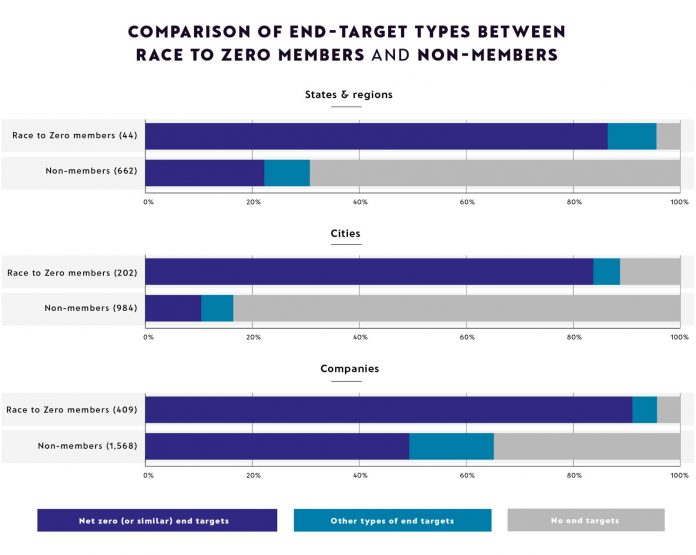As the climate crisis accelerates, the Net Zero Stocktake 2024 identifies a commitment gap across cities, states and regions, which is holding back the necessary economy-wide transition.
The Net Zero Tracker’s annual assessment of the intent and integrity of global climate commitments, shows only a modest increase in net zero targets set by subnational governments (states and regions, and cities) in the past year.
- 26% (185 of 706) of states and regions in the NZT database have net zero targets, collectively covering a population of 2.2 billion, up from 497 million in December 2020.
- 23% (271 of 1186) of major cities have set net zero targets, which represents a total population of 793 million, up from 640 million in December 2020.
- Most city-level net zero targets are in ‘high income’ countries (178 of 271 city-level net zero targets). Only 11% of the cities in lower income countries have net zero targets (93 of 842).
The initial phases of the net zero journey largely centred on setting national targets and on aligning companies with the Paris Agreement; today net zero targets are mainstream at the country-level and are a corporate norm.
- Net zero targets set by nations and self-governing territories (including the European Union and Taiwan) represent at least 87% of global GHG emissions, 93% of global GDP and 88% of global population.
- Nearly 60% of the 1,977 publicly-listed companies that NZT tracks have set net zero targets. Weighted by revenue, 67% have set net zero targets.
Some bright spots of progress can be seen in the subnational governments of 14 major-emitting nations. For example:
- In India, 14 of the 20 regions with a net zero target have a target year that is earlier than India’s national 2070 net zero target. These targets steer climate action on the ground and assure top-level ambition.
- In the United States, 18 states have set net zero targets, five of which have earlier net zero target years than the federal government’s 2050 target. In addition to the 18 states with net zero targets, nine states have emission reduction targets of 80% for 2050.
- In Mexico, which does not have a national-level net zero target, 11 of its 32 states have long-term climate targets, three of which are net zero targets.
However, the report calls for all cities, states and regions to translate their wide-ranging authority to establish and enforce policies and regulations into clear net zero plans.
Sybrig Smit, NewClimate Institute Analyst and the report lead, said, “The powers of subnational governments, to establish and enforce regulations, in areas ranging from urban planning, to transport, to waste and health, are critical to smoothing the path to net zero.
“If subnational powers are coupled with clear net zero commitments, it sends a clear signal to markets, and raises the ceiling of ambition at the national – and in turn the global level.”
Frederic Hans, NewClimate Institute Analyst, said, “Companies like Volvo Group and Google, and countries like Costa Rica are leading the way with innovative net zero strategies. Their experiences and the lessons they’ve learned to further improve their strategies set a powerful example for others to follow.”
“Peer learning will be crucial in shaping effective net zero strategies that align with the latest scientific insights and developments. This approach is essential as we navigate this pivotal decade in the fight against climate change.”
Net zero target-setting integrity remains low – companies lead on target upgrades
The Stocktake finds an increasing number of robust non-state (regions, cities and company) net zero targets and implementation plans, but with persistent gaps – and slow progress in net zero target integrity across all non-state entity types over the last two years.
The quality of the net zero commitments, measured against accepted integrity criteria, is only met by up to 5%, 4% and 3% of companies, cities and regions, respectively. However, the absolute number of companies that met all criteria increased by 62% compared with eighteen months ago.
The world’s largest alliance of 14,500 non-state and subnational entities, the Race to Zero campaign, led by the UN Climate Change High-Level Champions, was found to be a driver of net zero target-setting integrity.
Strikingly, more than 40% (1,700 / 3,870) of major non-state and subnational governments and companies are operating without any kind of emissions reduction target.
Camilla Hyslop, Data Lead, Net Zero Tracker (University of Oxford) said, “The large number of entities that continue to opt out of the globally-agreed mission to curtail climate change leaves their home countries and global supply chains highly vulnerable to transition risk.”
“By incentivizing and supporting companies and sub-national governments to set rigorous net zero targets and plans, countries can boost the credibility of national climate goals.”




